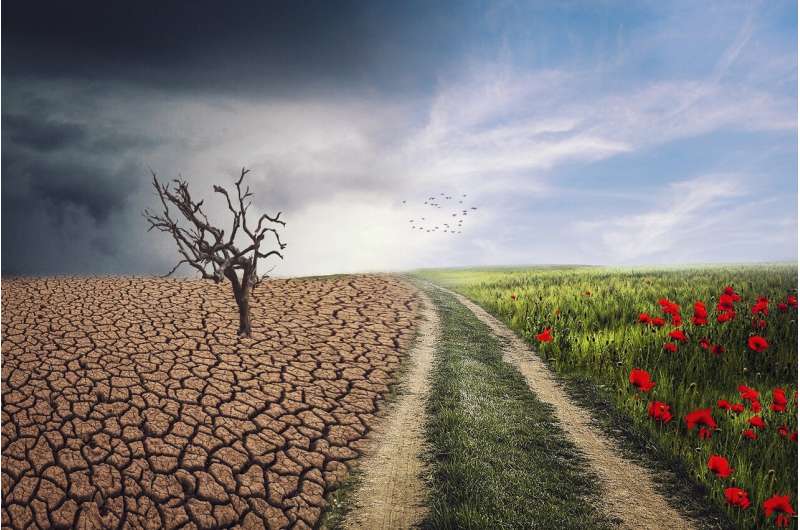IPCC report says climate change is causing dangerous disruption to nature

Scientists at the University of East Anglia (UEA) have played a leading role in the latest Intergovernmental Panel on Climate Change (IPCC) report, released today.
The report warns that human-induced climate change is causing dangerous and widespread disruption in nature and affecting the lives of billions of people around the world, despite efforts to reduce the risks. People and ecosystems least able to cope are being hardest hit.
Prof Rachel Warren and Dr. Jeff Price of the Tyndall Centre for Climate Change Research at UEA have played major roles in the report, both directly as authors and indirectly through their research. Their work (four different papers) is in eight chapters and one cross-chapter paper in AR6. Previously published work figures in key statements in the Asia and Central and South America chapters.
Prof Warren, Professor of Global Change and Environmental Biology, was a Lead Author for Chapter 16 (Key Risks Across Sectors and Regions), and led the development of the so called 'burning embers' synthesis diagram that shows how risk grows with increasing levels of global warming. For this the team conducted a global synthesis of risk and also looked at sectors like ecosystems and human health.
Prof Warren, who was also a Lead Author on the Summary for Policymakers and the Technical Summary, said: "In this latest report, the IPCC has reviewed new scientific information about observed climate change impacts and projected risks for human and natural systems.
"It looked at five reasons for concern about climate change. An example of one of these reasons to be concerned is 'risks from extreme weather events," which are already high with the present level of global warming of approximately 1.2C.
"If the globe continues to warm, the risks will increase in all the reasons for concern, and this increase in risk has been assessed to be much greater than previously thought. Specifically the report finds that very high risks emerge in all reasons for concern over the range 1.2 to 4.5C global average warming.
"Very high risks emerge for unique and threatened systems and extreme weather events over the range 1.2 to 2C global average warming. Limiting global average warming to 1.5C would limit many risks to a moderate level, and would keep the level of risks from extreme weather in the high category, as opposed to the very high one."
The Working Group II report examines the impacts of climate change on nature and people around the globe. It explores future impacts at different levels of warming and the resulting risks and offers options to strengthen nature's and society's resilience to ongoing climate change, to fight hunger, poverty, and inequality and keep Earth a place worth living on—for current as well as for future generations.
There are options to adapt to a changing climate and the report provides new insights into nature's potential not only to reduce climate risks but also to improve people's lives.
Dr. Jeff Price, Associate Professor Biodiversity and Climate Change, was a Lead Author on Cross-Chapter Paper 1 (Biodiversity Hotspots) and Chapter 2 (Terrestrial and Freshwater Ecosystems and their Services). He was also a Contributing Author in Chapter 9 (Africa); Chapter 13 (Europe); Chapter 15 (Small Islands); and Chapter 16 (Key Risks and Vulnerabilities).
Dr. Price said: "The report shows that climate change to date has already had significant impacts on ecosystems and biodiversity, and these are projected to grow increasingly severe over time.
"The report for the first time examines biodiversity hotspots and the impacts on terrestrial biodiversity on Small, and not-so-small, islands. The window for taking action is closing fast and unless action is stepped up there will be major impacts on biodiversity and ecosystems around the world."
Dr. Marie-Fanny Racault, Research Fellow in the School of Environmental Sciences at UEA, was a Lead Author on Chapter 3 (Ocean and Coastal ecosystems) and the Summary for Policy Makers.
Dr. Racault said: "The AR6 WGII report clearly shows the rapidly closing window for mitigation and adaptation actions to reduce climate risks under increasing global warming.
"Key to achieving this is to recognize that climate, biodiversity, and human society are interlinked, meaning actions and decisions would be implemented to get the best outcomes in each component."
Dr. Rhosanna Jenkins, a Visiting Fellow at the Tyndall Centre, was Chapter Scientist for Chapter 16 and worked with Dr. Price on Cross-Chapter Paper 1 (Biodiversity Hotspots), as a contributing author.
Dr. Jenkins added: "This report clearly shows that some impacts of climate change are already playing out and that every small increase in warming will result in worsening losses and damages to nature and society.
"Restoring ecosystems and protecting nature can reduce risks and help us adapt, but the effectiveness of this and other adaptation options declines with increased warming, underlining the importance of swift action."
The Summary for Policymakers of the IPCC Working Group II report, Climate Change 2022: Impacts, Adaptation and Vulnerability was approved on Sunday by 195 member governments of the IPCC, through a virtual approval session that was held over two weeks.
The Working Group II report is the second installment of the IPCC's Sixth Assessment Report (AR6), which will be completed this year.
Provided by University of East Anglia




















